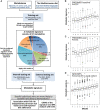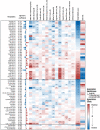The Mediterranean diet, plasma metabolome, and cardiovascular disease risk
- PMID: 32406924
- PMCID: PMC7377580
- DOI: 10.1093/eurheartj/ehaa209
The Mediterranean diet, plasma metabolome, and cardiovascular disease risk
Abstract
Aims: To investigate whether metabolic signature composed of multiple plasma metabolites can be used to characterize adherence and metabolic response to the Mediterranean diet and whether such a metabolic signature is associated with cardiovascular disease (CVD) risk.
Methods and results: Our primary study cohort included 1859 participants from the Spanish PREDIMED trial, and validation cohorts included 6868 participants from the US Nurses' Health Studies I and II, and Health Professionals Follow-up Study (NHS/HPFS). Adherence to the Mediterranean diet was assessed using a validated Mediterranean Diet Adherence Screener (MEDAS), and plasma metabolome was profiled by liquid chromatography-tandem mass spectrometry. We observed substantial metabolomic variation with respect to Mediterranean diet adherence, with nearly one-third of the assayed metabolites significantly associated with MEDAS (false discovery rate < 0.05). Using elastic net regularized regressions, we identified a metabolic signature, comprised of 67 metabolites, robustly correlated with Mediterranean diet adherence in both PREDIMED and NHS/HPFS (r = 0.28-0.37 between the signature and MEDAS; P = 3 × 10-35 to 4 × 10-118). In multivariable Cox regressions, the metabolic signature showed a significant inverse association with CVD incidence after adjusting for known risk factors (PREDIMED: hazard ratio [HR] per standard deviation increment in the signature = 0.71, P < 0.001; NHS/HPFS: HR = 0.85, P = 0.001), and the association persisted after further adjustment for MEDAS scores (PREDIMED: HR = 0.73, P = 0.004; NHS/HPFS: HR = 0.85, P = 0.004). Further genome-wide association analysis revealed that the metabolic signature was significantly associated with genetic loci involved in fatty acids and amino acids metabolism. Mendelian randomization analyses showed that the genetically inferred metabolic signature was significantly associated with risk of coronary heart disease (CHD) and stroke (odds ratios per SD increment in the genetically inferred metabolic signature = 0.92 for CHD and 0.91 for stroke; P < 0.001).
Conclusions: We identified a metabolic signature that robustly reflects adherence and metabolic response to a Mediterranean diet, and predicts future CVD risk independent of traditional risk factors, in Spanish and US cohorts.
Keywords: Cardiovascular disease; Dietary metabolic response; Mediterranean diet; Mendelian randomization analysis; Metabolomics; Risk prediction.
Published on behalf of the European Society of Cardiology. All rights reserved. © The Author(s) 2020. For permissions, please email: journals.permissions@oup.com.
Figures






Comment in
-
The metabolic signature: an emerging paradigm in cardiovascular nutritional health research?Eur Heart J. 2020 Jul 21;41(28):2657-2659. doi: 10.1093/eurheartj/ehaa260. Eur Heart J. 2020. PMID: 32357245 No abstract available.
Similar articles
-
Validation of the English Version of the 14-Item Mediterranean Diet Adherence Screener of the PREDIMED Study, in People at High Cardiovascular Risk in the UK.Nutrients. 2018 Jan 28;10(2):138. doi: 10.3390/nu10020138. Nutrients. 2018. PMID: 29382082 Free PMC article.
-
Plasma Metabolites From Choline Pathway and Risk of Cardiovascular Disease in the PREDIMED (Prevention With Mediterranean Diet) Study.J Am Heart Assoc. 2017 Oct 28;6(11):e006524. doi: 10.1161/JAHA.117.006524. J Am Heart Assoc. 2017. PMID: 29080862 Free PMC article. Clinical Trial.
-
Plasma Ceramides, Mediterranean Diet, and Incident Cardiovascular Disease in the PREDIMED Trial (Prevención con Dieta Mediterránea).Circulation. 2017 May 23;135(21):2028-2040. doi: 10.1161/CIRCULATIONAHA.116.024261. Epub 2017 Mar 9. Circulation. 2017. PMID: 28280233 Free PMC article. Clinical Trial.
-
Mediterranean-style diet for the primary and secondary prevention of cardiovascular disease.Cochrane Database Syst Rev. 2019 Mar 13;3(3):CD009825. doi: 10.1002/14651858.CD009825.pub3. Cochrane Database Syst Rev. 2019. PMID: 30864165 Free PMC article.
-
Considerations to facilitate a US study that replicates PREDIMED.Metabolism. 2018 Aug;85:361-367. doi: 10.1016/j.metabol.2018.05.001. Epub 2018 May 5. Metabolism. 2018. PMID: 29733820 Review.
Cited by
-
The salivary proteome reflects some traits of dietary habits in diabetic and non-diabetic older adults.Eur J Nutr. 2021 Dec;60(8):4331-4344. doi: 10.1007/s00394-021-02584-2. Epub 2021 May 26. Eur J Nutr. 2021. PMID: 34041584
-
Sex differences in endocannabinoids during 3 years of Mediterranean diet intervention: Association with insulin resistance and weight loss in a population with metabolic syndrome.Front Nutr. 2022 Dec 1;9:1076677. doi: 10.3389/fnut.2022.1076677. eCollection 2022. Front Nutr. 2022. PMID: 36532543 Free PMC article.
-
Cholesterol-Lowering Activity of Vitisin A Is Mediated by Inhibiting Cholesterol Biosynthesis and Enhancing LDL Uptake in HepG2 Cells.Int J Mol Sci. 2023 Feb 7;24(4):3301. doi: 10.3390/ijms24043301. Int J Mol Sci. 2023. PMID: 36834719 Free PMC article.
-
The Leptin System and Diet: A Mini Review of the Current Evidence.Front Endocrinol (Lausanne). 2021 Nov 24;12:749050. doi: 10.3389/fendo.2021.749050. eCollection 2021. Front Endocrinol (Lausanne). 2021. PMID: 34899599 Free PMC article. Review.
-
Serum metabolite signature of the modified Mediterranean-DASH intervention for neurodegenerative delay (MIND) diet.Metabolomics. 2024 Oct 21;20(6):118. doi: 10.1007/s11306-024-02184-1. Metabolomics. 2024. PMID: 39432124
References
-
- US Department of Agriculture and US Department of Health and Human Services. 2015–2020 Dietary Guidelines for Americans. Washington, DC: US Department of Health and Human Services; 2015. https://health.gov/dietaryguidelines/2015/ (15 January 2019).
-
- Benjamin EJ, Blaha MJ, Chiuve SE, Cushman M, Das SR, Deo R, de Ferranti SD, Floyd J, Fornage M, Gillespie C, Isasi CR, Jimenez MC, Jordan LC, Judd SE, Lackland D, Lichtman JH, Lisabeth L, Liu S, Longenecker CT, Mackey RH, Matsushita K, Mozaffarian D, Mussolino ME, Nasir K, Neumar RW, Palaniappan L, Pandey DK, Thiagarajan RR, Reeves MJ, Ritchey M, Rodriguez CJ, Roth GA, Rosamond WD, Sasson C, Towfighi A, Tsao CW, Turner MB, Virani SS, Voeks JH, Willey JZ, Wilkins JT, Wu JH, Alger HM, Wong SS, Muntner P; American Heart Association Statistics Committee and Stroke Statistics Subcommittee. Heart disease and stroke statistics-2017 update: a report from the American Heart Association. Circulation 2017;135:e146–e603. - PMC - PubMed
-
- Estruch R, Ros E, Salas-Salvadó J, Covas M-I, Corella D, Arós F, Gómez-Gracia E, Ruiz-Gutiérrez V, Fiol M, Lapetra J, Lamuela-Raventos RM, Serra-Majem L, Pintó X, Basora J, Muñoz MA, Sorlí JV, Martínez JA, Fitó M, Gea A, Hernán MA, Martínez-González MA; PREDIMED Study Investigators. Primary prevention of cardiovascular disease with a Mediterranean diet supplemented with extra-virgin olive oil or nuts. N Engl J Med 2018;378:e34. - PubMed
-
- Salas-Salvado J, Bullo M, Babio N, Martinez-Gonzalez MA, Ibarrola-Jurado N, Basora J, Estruch R, Covas MI, Corella D, Aros F, Ruiz-Gutierrez V, Ros E; PREDIMED Study Investigators. Reduction in the incidence of type 2 diabetes with the Mediterranean diet: results of the PREDIMED-Reus nutrition intervention randomized trial. Diabetes Care 2011;34:14–19. - PMC - PubMed
Publication types
MeSH terms
Grants and funding
- R01 CA050385/CA/NCI NIH HHS/United States
- R01 DK102896/DK/NIDDK NIH HHS/United States
- P30 DK040561/DK/NIDDK NIH HHS/United States
- U01 HL145386/HL/NHLBI NIH HHS/United States
- P01 CA087969/CA/NCI NIH HHS/United States
- R01 CA067262/CA/NCI NIH HHS/United States
- UM1 CA176726/CA/NCI NIH HHS/United States
- U01 CA176726/CA/NCI NIH HHS/United States
- R01 HL118264/HL/NHLBI NIH HHS/United States
- U01 CA167552/CA/NCI NIH HHS/United States
- P30 DK046200/DK/NIDDK NIH HHS/United States
- R01 AR049880/AR/NIAMS NIH HHS/United States
- R01 HL034594/HL/NHLBI NIH HHS/United States
- UM1 CA186107/CA/NCI NIH HHS/United States
- K99 DK122128/DK/NIDDK NIH HHS/United States
- UM1 CA167552/CA/NCI NIH HHS/United States
- R01 HL035464/HL/NHLBI NIH HHS/United States
- R00 CA207736/CA/NCI NIH HHS/United States
- R01 HL088521/HL/NHLBI NIH HHS/United States
- R01 CA049449/CA/NCI NIH HHS/United States
- R01 HL060712/HL/NHLBI NIH HHS/United States
LinkOut - more resources
Full Text Sources
Other Literature Sources

